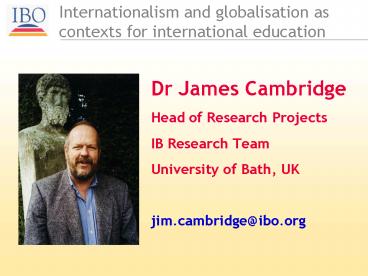Internationalism and globalisation as contexts for international education - PowerPoint PPT Presentation
1 / 18
Title:
Internationalism and globalisation as contexts for international education
Description:
... and globalisation as contexts for international education. Dr James Cambridge ... International ... instrumental order map onto globalist' international education? ... – PowerPoint PPT presentation
Number of Views:237
Avg rating:3.0/5.0
Title: Internationalism and globalisation as contexts for international education
1
Internationalism and globalisation as contexts
for international education
- Dr James Cambridge
- Head of Research Projects
- IB Research Team
- University of Bath, UK
- jim.cambridge_at_ibo.org
2
Internationalism
- is seen by its advocates as the antithesis of
both nationalism and isolationism. It denotes a
cosmopolitan, nonparochial stance toward
obligation beyond borders (Lynch 1999).
3
Tension between perspectives
- Globalisation is seen as economic integration,
achieved in particular through the establishment
of a global marketplace marked by free trade and
a minimum of regulation. - In contrast, internationalism refers to the
promotion of global peace and well-being through
the development and application of international
structures, primarily but not solely of an
intergovernmental kind. - Despite important conceptual difficulties in
formulating the case for internationalism and
despite the worlds patchy record of putting its
principles into effect, the essentially
pro-democratic logic of internationalism stands
in sharp contrast to the logic of globalisation
(Jones 1998).
4
Contrasting perspectives
- internationalist an orientation towards
international relations, with aspirations for the
promotion of peace and understanding between
nations. - globalist influenced by and contributing to the
global diffusion of the values of free market
capitalism.
5
International education
- internationalist a transformative discourse
which locates all fields of enquiry in a
supra-national frame of reference and upholds the
cause of peace (Rawlings 2000). - globalist may be compared with other globally
marketed goods and services such as soft drinks
and hamburgers a reliable product conforming to
consistent quality standards throughout the
world (Cambridge 2000).
6
Contrasting philosophies and aims
- internationalist an existential, experiential
philosophy of education which values the moral
development of the individual and recognises the
importance of service to the community and the
development of a sense of responsible
citizenship. - globalist serves a market which requires the
global certification of educational
qualifications for portability between schools
and transferability between systems.
7
Approaches to cultural diversity
- internationalist celebrates cultural diversity
and promotes international co-operation
internationally-minded outlook. - globalist leading to global cultural convergence
towards the values of the transnational
capitalist class (Sklair 2001)
8
Multiculturalism
- Multiculturalism in education can be a
substantial monoculturalism as to values,
mitigated by tolerance of exotic detail (Zaw
1996)
9
Implications for management
- Global capitalism succeeds by turning most
spheres of social life into businesses, by making
social institutions - such as schools,
universities, prisons, hospitals, welfare systems
- more business-like (Sklair 2001) - Language and practice of managerialism, of
accountability, inspection, testing and targets
preclude debates about the purposes of education
beyond preparation for the economy (Tomlinson
2000) - Discourse of New Public Management draws
attention to outputs and performance rather than
inputs, views organisations as chains of
low-trust relationships, identifies parts of
organisations as profit centres, uses competition
to enable exit or choice by service
consumers, and decentralises budgetary and
personal authority to line managers (Clarke et al
2000)
10
Performativity
- Education is no longer to be concerned with the
pursuit of ideals such as personal autonomy or
emancipation, but with the means, techniques or
skills that contribute to the efficient operation
of the state in the world market and contribute
to maintaining the internal cohesion and
legitimation of the state (Marshall 1999) - Performativity is a technology, a culture, and a
mode of regulation that employs judgment,
comparisons, and displays as means of control,
attrition, and change (Ball 2000) - In a performative culture, demonstrated
productivity by everyone is demanded and all
participants in an organisation/school are
required to develop as active, enterprising, and
optimistic individuals who are market assets
(Meadmore Meadmore 2004).
11
Emancipatory reason gives way to technocratic
rationalisation (Lyon 1999)
- The global market requires a shift in the
institutional culture-ideology of schools away
from exclusively pedagogical issues towards the
development of market-oriented values. - Values of free market capitalism associated with
globalist international education are leading to
transformation of international education into a
globally branded product.
12
Educational values (Bernstein 1977)
- Expressive order conduct, character, manner
- Instrumental order specific skills and bodies of
knowledge.
13
Typology of schools
14
Instrumentalisation of the expressive
- Cultivation of expressive order values to enhance
performativity - Appropriation of other intelligences, such as
emotional intelligence, which can somehow
combine with bureaucratic rationality, as a way
of creating more successful schools and
businesses (Hartley 2003)
15
Strategic use of diversity
- The spirit of multiculturalism in education has
shifted from a concern with the formation of
tolerant and democratic national citizens who can
work with and through difference - to a more strategic use of diversity for
competitive advantage in the global workplace
(Mitchell 2003).
16
Strategic cosmopolitan (Mitchell 2003)
- A move away from person-centred education for
all, or the creation of the tolerant,
multicultural self - towards a more individuated, mobile and highly
tracked, skills-based education, or the creation
of the strategic cosmopolitan.
17
Typology of schools
18
Issues for further discussion
- Are the internationalist and globalist
perspectives of international education opposite
or complementary? - To what extent does Bernsteins expressive order
map onto internationalist international
education? - Does Bernsteins instrumental order map onto
globalist international education? - How do IB programmes balance expressive order and
instrumental order values? - How do IB programmes balance international values
and globalist values? - How do we know? In what ways can values be
recognised?































